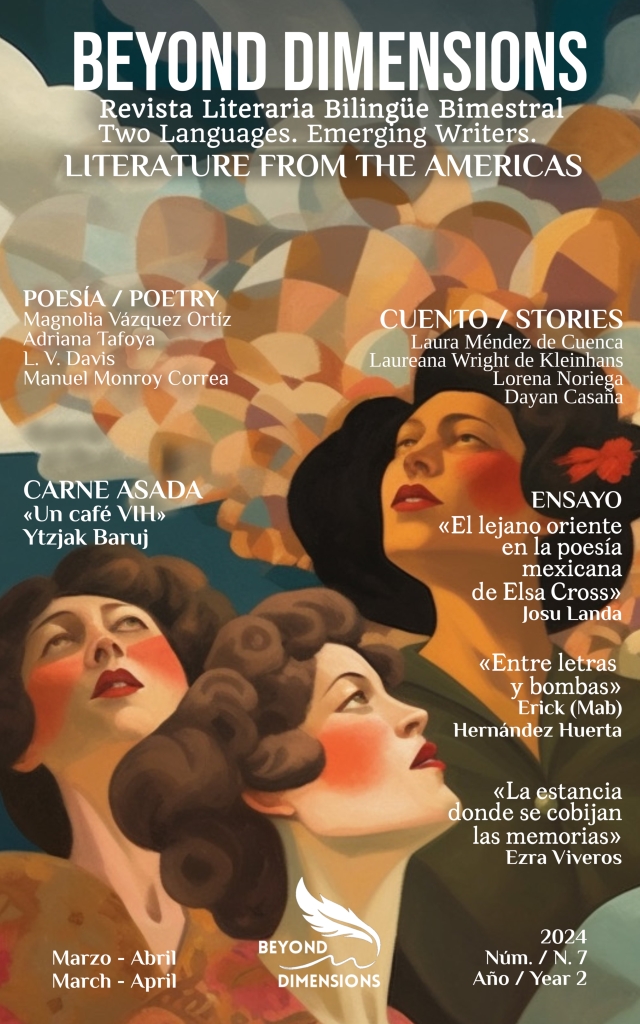por Armando M. Morales
Era viernes, el día de Freya, en el año de la Gran Depresión descrito por Joyce como la caída de Humpty Dumpty. Quien diría que un ejecutivo del banco fuera tan bello como para esconder los horrores abstractos de la economía, los hilos enredados de un laberinto burocrático y en continua expansión.
Me preguntas por qué estoy en la cárcel, pues yo iba a solicitar un segundo préstamo para abrir una tienda de burbujas, rehiletes, máscara, yoyos, papalotes y globos. Puse mi mano sobre el escáner de huellas digitales y mis huellas no fueron reconocidas, escribí mi firma 13 veces en el contrato y los ejecutivos circundantes no reconocieron la firma como la misma.
Firmar es algo instintivo y ágil, como la manera de hablar, pero incluso cuando hablamos no deja de haber inflexiones accidentales e inconscientes, de modo que podemos descubrir un patrón picado por pequeñas modulaciones. Esa solución práctica no era reconocida por los revisores secretos, ellos entendían la multiplicidad de modulaciones como una multiplicidad esencial, por ello me obligaron a firmar durante 4 horas para recrear la unidad en la identidad de mis firmas, 4 horas intentando recrear la firma original, tan instintiva y accidental como cualquier otra firma. Traté de todas las formas: firmar de manera lenta y esforzada para imitar la firma original, cosa que fracasaba porque era como tomar la fotografía de una cascada, imagen que no reproduce el movimiento de la cascada; intenté firmar de forma espontánea como lo haría en otras circunstancias, pero no tuve éxito y no dejaba de alejarme a través de las microvariaciones de la firma original. Mientras firmaba innumerables veces, imaginaba que el bello ejecutivo era mi amor, cómo lo hubiera abanicado con billetes, también le hubiera comprado un buda gordo de la abundancia, pero mi fantasía era interpelada por el temor de que el bello ángel acudiera a los revisores ante cualquier capricho y arruinara mi economía para siempre, pero un amor secreto con él valía arriesgarse.
Tanta era la generosidad de los revisores por permitirme 4 horas para reintegrar mi identidad ante ellos, pero nunca vi a los revisores, los escuchaba conjurar con sus voces robóticas a través de las bocinas del banco, le supliqué al hermoso ejecutivo que intercediera por mí ante los revisores para que vieran mi rostro y reconocieran la unidad entre mi rostro y mi identificación gubernamental pero el bello me dijo que los revisores nunca condescienden para ver la cara de nadie y solo expresan sus apelaciones a través de las bocinas y el teléfono.
Finalmente ellos llegaron al fallo irrevocable de que yo hacía fraude bancario, toda vez que mis huellas digitales no eran leídas y mi firma no coincidía con la firma del primer préstamo.
Alrededor había gritos de fiesta.
La policía llegó para esposarme y ahora estoy en la cárcel por haber suplantado mi propia identidad, sigo en la vida pero sin la posibilidad de regresar a la identidad y coincidencia conmigo, debería ser libre y feliz con ello pero no lo soy.
The Bank Appointment
by Armando M. Morales
Translated by Keith Grimes
It was Friday, Freya’s day, in the year of the Great Depression, which Joyce described as the fall of Humpty Dumpty. Who knew a bank executive could be so attractive as to hide the abstract horrors of financial management, the tangled threads of an ever-expanding bureaucratic labyrinth?
You ask me why I’m in jail. Well, I already had one loan, and I was going to apply for a second one to finance the opening of a bubble, pinwheel, mask, yo-yo, kite, and balloon store. As instructed, I put my fingers on the fingerprint scanner, but my fingerprints were not recognized. I wrote my signature 13 times on the contract, but the surrounding executives did not recognize the signature as mine.
Signing is intuitive and agile, like how we speak. But even when we talk, there are still accidental and unconscious inflections so that we can discover patterns cut up by small modulations. The secret reviewers did not recognize that practical solution; they understood the diversity of modulations as essential, so they forced me to sign for four hours to recreate unity in writing and rewriting my signatures. Four hours were spent trying to recreate the original signature, as spontaneous and accidental as any other signature. I tried every way: signing slowly and painstakingly to imitate the original signature, which failed because it was like taking a photograph of a waterfall, an image that does not reproduce the movement of the waterfall; signing spontaneously as I would otherwise do, but I was unsuccessful and kept drifting away through the micro-variations of the original signature. As I signed countless times, I imagined that the handsome executive was my lover, how I would have fanned him with bills and compared him to a fat Buddha of plenty, but my fantasy was interrupted by the fear that the angelic executive would go to the reviewers at his whim and ruin my finances forever. Still, the possibility of a secret love with him was worth the risk.
The inspectors were very generous for allowing me four hours to prove my identity before them, but I had yet to see the inspectors. I heard them conjuring with their robotic voices through the bank loudspeakers. I begged the handsome executive to intercede for me before the inspectors compared my face and the photo on my government ID, but the beautiful one told me that the inspectors never attempted to see anyone’s face and only expressed their earnest requests through the bank loudspeakers and the phone.
Finally, they irrevocably decided that I was committing bank fraud because my fingerprints were not read, and my signature did not match the signature on the first loan.
All around were shouts of celebration.
The police arrived and handcuffed me. Now, I am in jail for having faked my own identity. I am still alive but without the possibility of returning to my identity and being one with myself. I should be free and happy with it, but I am not.
Armando M. Morales was born in 1992 in Mexico City. He studied philosophy at the Faculty of Philosophy and Letters at UNAM; he is a professor at EPOEM 81. Armando has published books of poetry such as El evangelio de la depresión (Verso destierro), Mis sueños terminan con la muerte (Editorial Chiplotle) and Poemas para prevenir el suicidio (Poems to Prevent Suicide) (Campo literario) and Enamorado de fantasmas (Verso destierro). Armando has participated in anthologies of the El Canto de la Alondra publishing house. He has a YouTube channel called Armando Canal de Literatura.

Armando M. Morales nació en 1992 en la Ciudad de México; estudió filosofía en la Facultad de Filosofía y Letras de la UNAM; es profesor de la EPOEM 81. Ha publicado libros de poesía como El evangelio de la depresión (Verso destierro), Mis sueños terminan con la muerte (Editorial Chiplotle) y Poemas para prevenir el suicidio (Campo literario) y Enamorado de fantasmas (Verso destierro). Ha participado de antologías de la editorial El canto de la alondra. Tiene un canal en Youtube llamado Armando canal de literatura.



Deja un comentario